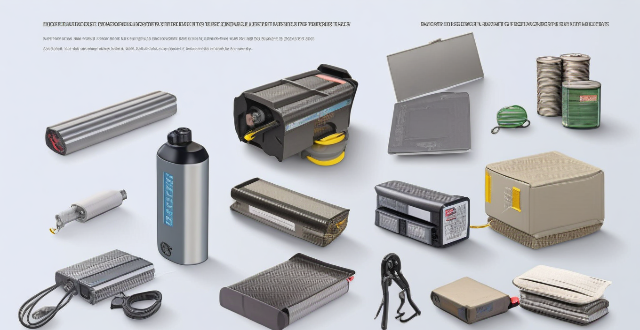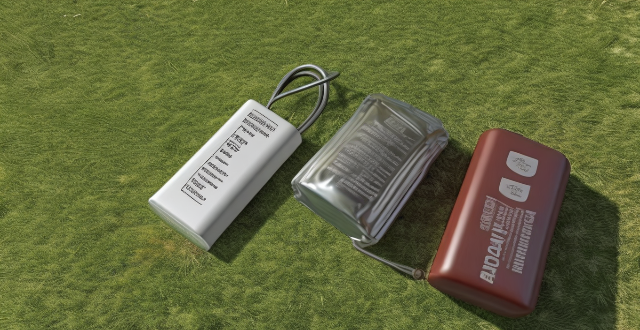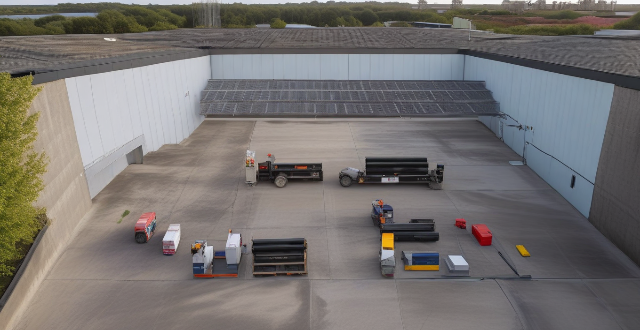Lead Protect

What are the safety precautions to take when handling lead-acid batteries ?
When dealing with lead-acid batteries, it's crucial to follow certain safety precautions to protect yourself and your surroundings. Here are some essential guidelines: ### Personal Protective Equipment (PPE) - Always wear goggles to protect your eyes from acid splashes or lead particles. - Use acid-resistant gloves to prevent skin contact with battery acid. - Wear long sleeves and an acid-resistant apron to protect your clothing and skin. - Consider using a face shield if working in an environment where battery explosion is possible. ### Ventilation - Ensure proper ventilation when charging, testing, or working near lead-acid batteries. - Avoid breathing in the fumes released by the batteries. ### Handling - Lift batteries carefully to avoid straining your back or dropping them. - Keep batteries upright to prevent acid leakage. - Do not place metal objects across the terminals to avoid short circuiting. ### Charging - Charge batteries in a well-ventilated area away from flames or sparks. - Use a dedicated charger suitable for the specific type of lead-acid battery you are charging. - Never overcharge the battery as it can cause damage or even explosion. ### Storage - Store batteries in a cool, dry place away from direct sunlight. - Keep them on a non-conductive surface to prevent short circuits. - Ensure that the storage area is well-ventilated. ### Disposal - Do not dispose of lead-acid batteries in regular trash. - Take them to a certified recycling center or a facility that accepts hazardous waste. - Clean up any spilled acid immediately with a solution of baking soda and water, then dispose of the cleaning materials properly. ### First Aid - If acid comes into contact with your skin, wash immediately with plenty of water and seek medical attention if necessary. - In case of eye contact, flush your eyes with water for at least 15 minutes and get immediate medical help. ### Training - Make sure you are trained in the correct procedures for handling lead-acid batteries. - Stay informed about the latest safety practices and equipment.

What are the most effective ways to protect against radiation exposure ?
Radiation exposure can be harmful to our health, and it is essential to take measures to protect ourselves from its effects. Here are some of the most effective ways to protect against radiation exposure, including using shielding materials, maintaining a safe distance, wearing protective clothing, following safety guidelines, getting regular check-ups, eating a healthy diet, and staying informed.

How can I protect myself from getting infected with COVID-19 ?
The text provides tips on how to protect oneself from getting infected with COVID-19, including washing hands frequently, covering mouth and nose when coughing or sneezing, practicing social distancing, wearing a mask in public, staying home as much as possible, and getting vaccinated if eligible. These precautions can help reduce the risk of infection and protect oneself and others.

How do vaccines work to protect against disease ?
Vaccines protect against disease by introducing a small amount of the pathogen into the body, triggering the immune system to produce antibodies that protect against future infections with the same pathogen. There are several types of vaccines with unique mechanisms of action and effectiveness against specific pathogens. The development of vaccines is a complex process requiring extensive testing and research, but they have been shown to be highly effective at preventing serious diseases.

How can we protect ourselves from radiation exposure during space travel or living on other planets ?
Radiation exposure is a significant concern for astronauts during space travel and for future settlers on other planets. Shielding, distance, time management, and medication and supplementation are effective ways to protect against radiation. Lead, concrete, and water are good shielding materials. Distance from the source of radiation reduces exposure. Time management involves limiting the duration of exposure. Antioxidants, amifostine, and melatonin may help protect against radiation damage by reducing oxidative stress and promoting DNA repair.

How long does a lead-acid battery last ?
Lead-acid batteries are commonly used in various applications, including vehicles, uninterruptible power supplies (UPS), and renewable energy storage systems. The lifespan of a lead-acid battery depends on several factors, such as its type, usage, and maintenance. In this article, we will discuss the typical lifespan of lead-acid batteries and provide tips for extending their service life.

What strategies can be implemented to protect forests from the effects of climate change ?
The article discusses the importance of forests in regulating the Earth's climate and outlines several strategies to protect them from climate change, including afforestation and reforestation, sustainable forest management, fire prevention and control, promoting biodiversity, and education and awareness programs.

How can women protect themselves from gender-based discrimination and harassment ?
Gender-based discrimination and harassment are pervasive issues that women face in various settings, including the workplace, education, and public spaces. To protect themselves, women can take several proactive steps to ensure their safety and well-being, including educating themselves about their rights and forms of harassment, creating a supportive network, taking preventive measures, reporting incidents promptly, seeking legal advice and counseling services when needed, and advocating for change by raising awareness and participating in policy making. By employing these strategies, women can better protect themselves from gender-based discrimination and harassment while also contributing to a broader cultural shift towards equality and respect.

How does a lead-acid battery work ?
Lead-acid batteries work on the principle of converting chemical energy into electrical energy and vice versa. They consist of an electrolyte, plates, and separators. During charging, an external power source applies a voltage higher than the open-circuit voltage of the battery, causing lead sulfate on the positive plate to be converted back into lead dioxide and on the negative plate into metallic lead. During discharging, when a load is connected to the battery, lead dioxide on the positive plate is reduced to lead sulfate, and metallic lead on the negative plate is oxidized to lead sulfate. The electrons flow from the negative terminal of the battery to the load during discharging and from the positive terminal of the external power source to the positive plate of the battery during charging.

Can a home security system protect against natural disasters like floods or fires ?
A home security system is primarily designed to protect against intruders and theft, but some advanced systems can also provide protection against natural disasters like floods or fires. Smoke detectors and heat sensors are essential for early detection of fires, while water sensors can detect high moisture levels indicating potential flooding. While home security systems don't typically offer protection against earthquakes directly, they can still be useful in emergencies by providing communication capabilities and access to emergency services. By integrating features like smoke detectors, heat sensors, water sensors, and smart home automation, you can extend the functionality of your home security system to protect against natural disasters like floods or fires.

Can you recharge a dead lead-acid battery ?
Recharging a dead lead-acid battery is possible, but it depends on the condition of the battery and how long it has been discharged. Here are some steps to follow when attempting to recharge a dead lead-acid battery: Check the battery's condition, determine the battery's voltage, choose the right charger, connect the charger to the battery, monitor the charging process, and test the battery after charging. In summary, recharging a dead lead-acid battery is possible as long as the battery is in good condition and the correct charging procedures are followed.

Can a VPN service protect me from hackers and cyber threats ?
VPN services create an encrypted connection over the Internet, allowing users to securely send and receive data as if their devices were on a private network. This enhances privacy by masking IP addresses, protects data on public Wi-Fi, and enables access to geo-restricted content. However, VPNs are not a complete cyber defense solution; they do not protect against all malware or phishing attacks. Trustworthiness of the provider is crucial, and legal and performance considerations should be noted. Responsible use includes pairing VPNs with other security measures and adhering to ethical guidelines. As technology advances, expect more sophisticated VPN services, but awareness about their role in cyber defense is also growing.

What is the difference between a sealed and unsealed lead-acid battery ?
Sealed lead-acid batteries are maintenance-free and have a longer lifespan than unsealed batteries. They also have a lower self-discharge rate and no risk of acid spillage. Unsealed lead-acid batteries require regular maintenance, including checking the electrolyte level and adding distilled water when necessary. They generally have a shorter lifespan and a higher self-discharge rate compared to sealed batteries. There is also a risk of acid spillage if the battery is damaged or mishandled.

Can cultural fusion lead to a loss of cultural identity ?
Cultural fusion, the blending of different cultures, has been a phenomenon for centuries. However, with globalization and the rise of social media, cultural fusion has become more prevalent than ever before. While it can lead to the creation of new and exciting cultural expressions, it can also raise concerns about the potential loss of cultural identity. This article explores whether cultural fusion can indeed lead to a loss of cultural identity by examining the benefits of cultural fusion, the potential loss of cultural identity, and ways to maintain cultural identity amidst fusion.

How can you maintain a lead-acid battery to extend its lifespan ?
Lead-acid batteries are commonly used in vehicles, UPS, and solar storage systems. To ensure their longevity, it's essential to maintain them properly. Here's how you can extend the lifespan of your lead-acid battery: prevent overcharging, avoid deep discharges, maintain proper fluid levels, keep the battery clean, and store properly when not in use. By following these maintenance tips, you can significantly extend the lifespan of your lead-acid battery and ensure reliable performance for years to come.

How often should you replace a lead-acid battery in a car ?
Replacing the lead-acid battery in your car is crucial for maintaining its performance and reliability. The lifespan of a lead-acid battery can vary depending on various factors, such as usage, maintenance, and environmental conditions. In this article, we discussed how often you should replace a lead-acid battery in a car. Before diving into the replacement frequency, it's essential to understand the factors that can affect the lifespan of a lead-acid battery. These factors include usage, maintenance, environmental conditions, and manufacturer. Frequent short trips, neglecting regular maintenance, extreme temperatures, and differences in materials and construction can all impact the battery's lifespan. For vehicles that are used regularly, it is generally recommended to replace the lead-acid battery every 3-5 years. However, this can vary based on the factors mentioned above. If you take good care of your battery and maintain it properly, it may last longer than 5 years. On the other hand, if you frequently expose your battery to harsh conditions or neglect its maintenance, it may need replacement sooner. If your vehicle is used infrequently, the lead-acid battery may not get enough time to recharge fully between uses. In such cases, it is advisable to replace the battery every 2-4 years to ensure reliable starting and avoid being stranded with a dead battery. Regardless of the age or usage of your battery, there are certain signs that indicate it may be time for a replacement. These signs include slow starting, dim headlights, corrosion, and age. It is generally recommended to have your battery tested by a professional if it is more than 5 years old to determine its remaining lifespan. In conclusion, replacing the lead-acid battery in your car is an inevitable part of vehicle ownership. The frequency at which you should replace it depends on various factors, including usage, maintenance, environmental conditions, and manufacturer. As a general guideline, replacing the battery every 3-5 years for regular use and every 2-4 years for infrequent use is recommended. However, always keep an eye out for signs of battery failure and consult with a professional if you are unsure about the health of your battery.

What are the different types of protective clothing available ?
Protective clothing is essential in various industries and environments to ensure the safety and well-being of individuals. It is designed to protect against hazards such as chemicals, biological agents, radiation, heat, cold, electrical shocks, and physical injuries. There are different types of protective clothing available, including chemical protective clothing, biological protective clothing, radiation protective clothing, thermal protective clothing, electrical protective clothing, and physical protective clothing. Each type of protective clothing is designed to protect against specific hazards and includes a range of garments and accessories.

Can poor personal hygiene lead to skin problems ?
Poor personal hygiene can lead to a variety of skin problems, including bacterial and fungal infections, irritation and inflammation, and other conditions. To prevent these issues, it's important to practice good hygiene, such as regular showering, wearing clean clothes, hand washing, moisturizing, and sun protection.

Can climate change lead to an increase in cardiovascular diseases ?
The article discusses the relationship between climate change and cardiovascular diseases, highlighting how extreme heat events, changes in air quality, and extreme weather patterns can contribute to an increase in heart-related illnesses. It explains how dehydration and electrolyte imbalances caused by heat stress can strain the heart, leading to chest pain, shortness of breath, and even heart failure. The article also points out that rising temperatures can cause pollutants like ozone and particulate matter to become more concentrated in the air we breathe, irritating the lungs and reducing oxygen uptake, which can strain the heart. Additionally, extreme weather events like hurricanes, floods, and wildfires can have both direct and indirect effects on cardiovascular health by causing physical trauma, stress, lack of access to medical care, and disruptions in medication adherence and continuity of care for those with chronic cardiovascular diseases. The article concludes by emphasizing the importance of taking steps to protect cardiovascular health, such as staying hydrated during hot weather, monitoring air quality, and having emergency plans in place for natural disasters.

What is the environmental impact of disposing lead-acid batteries ?
Lead-acid battery disposal has significant environmental impacts due to hazardous materials and waste management challenges. To mitigate these, strategies like recycling programs, proper handling, public awareness campaigns, and legislation/regulations should be implemented.

How does protective clothing protect against radioactive substances ?
Protective clothing shields wearer from radiation exposure by acting as a barrier between them and the radioactive substance. Shielding materials used, such as lead or other heavy metals, reduce the radiation's intensity and prevent it from reaching the body. Thickness and density of the material are crucial in determining protection level. Maximum coverage area is necessary, including all skin surfaces and extremities. There are two main types: disposable (single-use) and reusable (can be cleaned and reused). Levels of protection vary depending on expected radiation exposure. Proper maintenance and care ensure effectiveness over time.

What are the potential benefits of carbon capture technology for the environment ?
Carbon capture technology can help reduce greenhouse gas emissions, improve air quality, encourage economic growth, and enhance ecosystem health. It has the potential to mitigate climate change, meet emission reduction targets, enhance energy security, reduce pollutants, protect human health, create jobs, stimulate innovation, promote clean energy, protect biodiversity, preserve natural resources, and restore degraded landscapes. Investing in carbon capture technology may prove to be crucial for creating a more sustainable future.

How can I protect my home network from cyber attacks ?
The text provides a topic summary on how to protect your home network from cyber attacks. It suggests changing default settings such as passwords and firmware, using strong passwords, securing your Wi-Fi network with WPA2 encryption, keeping devices updated with software patches and antivirus software, and educating yourself and family members about safe online practices. Following these steps can help reduce the risk of cyber attacks and keep personal information secure.

How can I protect my online privacy ?
In today's digital age, online privacy is a major concern. Here are some tips to help you protect your online privacy: Use Strong Passwords: Use a combination of letters, numbers, and symbols; avoid using personal information; change your passwords regularly. Be Careful with Personal Information: Don't share too much; be wary of scams; keep sensitive information private. Use Two-Factor Authentication: Enable two-factor authentication (2FA); use authenticator apps; be cautious with backup codes. Keep Your Software Up-to-date: Update regularly; use antivirus software; be cautious with downloads. Use Encryption: Use HTTPS; use VPNs; encrypt sensitive files. Be Careful on Social Media: Adjust privacy settings; think before you post; be cautious with friend requests.

How can I protect my retirement savings from inflation ?
Inflation can significantly erode the value of retirement savings over time. To protect your nest egg, consider diversifying your portfolio with stocks, real estate, and commodities. Investing in inflation-protected securities (TIPS) and fixed index annuities can also help maintain purchasing power. Global diversification, particularly in emerging markets, offers growth opportunities and hedges against local economic conditions. Maintaining a cash reserve for liquidity and short-term needs is crucial, as is regularly rebalancing your portfolio to stay on track with your goals. Delaying Social Security benefits can lead to higher monthly payments, acting as longevity insurance. Increasing contributions, especially if matched by employers, and working with a financial advisor for personalized guidance are other effective strategies. By employing these tactics, you can safeguard your retirement savings from inflation and ensure a comfortable retirement.

Can vaccines protect against new virus variants ?
**Can Vaccines Protect Against New Virus Variants?** The ability of vaccines to protect against new virus variants depends on various factors, including the type of vaccine, the nature of the virus, and the rate of mutation. While some vaccines may provide cross-reactivity and adaptive immunity against multiple strains, others may require updates or booster shots to maintain protection against emerging variants. Public health measures such as masking, social distancing, and hand hygiene remain crucial in combination with vaccination efforts. Continuous global surveillance is essential for developing effective strategies to deal with new variants.

How does climate change affect human health ?
Climate change affects human health in numerous ways, including increased risk of extreme weather events like heatwaves, floods, and hurricanes that can lead to dehydration, injuries, and displacement. Changes in disease vectors due to warmer temperatures allow the spread of mosquito-borne and tick-borne diseases. Longer growing seasons result in higher pollen counts, worsening allergies, while wildfires and dust storms reduce air quality causing respiratory issues. Food security is also affected as droughts and extreme temperatures can lead to crop failures and malnutrition. Mental health impacts include stress and anxiety from disaster-related trauma and economic stress. Addressing this challenge requires adaptation strategies, mitigation efforts, and public health preparedness.

What regulations govern Cross-Border Payment ?
Regulations governing cross-border payment include Anti-Money Laundering (AML) laws, Payment Card Industry Data Security Standard (PCI DSS), International Wire Transfer Regulations, and General Data Protection Regulation (GDPR). These regulations ensure the security, safety, and efficiency of the process by requiring financial institutions to verify customer identity, monitor transactions for suspicious activity, protect cardholder data, comply with US sanctions and embargoes, and protect personal data.

Can someone hack into my device through public Wi-Fi ?
Public Wi-Fi networks pose a significant risk to the security of your devices due to various types of attacks such as man-in-the-middle, eavesdropping, and malware distribution. To protect yourself from these threats, it is recommended to use a virtual private network (VPN), avoid accessing sensitive information on public Wi-Fi, keep your device up-to-date, use two-factor authentication, and be wary of rogue Wi-Fi networks. Following these tips can significantly reduce the chances of falling victim to hackers and protect your personal information from being stolen or compromised.

What are the key components of environmental legislation ?
The article discusses the key components of environmental legislation, which are designed to protect the environment and promote sustainable development. These include Environmental Impact Assessment (EIA), Pollution Control Laws, Conservation Laws, and Sustainable Development Policies. The EIA process involves screening, scoping, reporting, review, and monitoring to identify and mitigate potential adverse impacts of proposed projects on the environment. Pollution control laws regulate emissions and discharges into air, water, and land to prevent pollution and protect public health and the environment through emission standards, discharge permits, and waste management regulations. Conservation laws aim to protect endangered species, habitats, and ecosystems from destruction or degradation caused by human activities through protected areas, species protection, and habitat restoration measures. Sustainable development policies focus on balancing economic growth with social equity and environmental protection to meet present needs without compromising future generations' ability to meet their own needs through integrated planning, resource efficiency, and fostering a green economy. Overall, environmental legislation plays a crucial role in protecting our planet's natural resources and ensuring sustainable development for future generations.